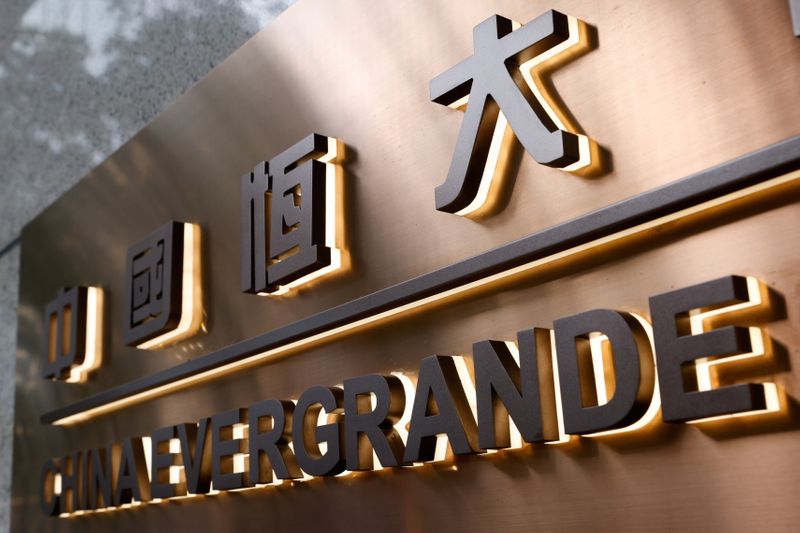By Andrew Galbraith and Marc Jones
SHANGHAI/LONDON (Reuters) - The rumbling crisis at China Evergrande Group and other major homebuilders drove debt market risk premiums on weaker Chinese firms to a record high on Wednesday and triggered a fresh round of credit rating downgrades.
Evergrande, which has more than $300 billion in liabilities and 1,300 real estate projects in over 280 cities, missed a third round of interest payments on its international bonds this week, and other firms have also warned they could default.
Rating agency S&P Global (NYSE:SPGI) delivered fresh downgrades to two of the sector's bigger firms, Greenland Holdings - which has built some of the world's tallest residential towers - and E-house, and warned it could cut their ratings further.
The $5 trillion property sector accounts for around a quarter of the Chinese economy by some metrics. In the clearest sign yet that global investors' worries are growing, the spread - or risk premium - on investment grade Chinese firms, which tend to have the most solid finances, jumped to its widest in more than two months.
The spread on the equivalent high-yield or 'junk'-rated index that the likes of Evergrande are part of surged to a new all-time high of 2,337 basis points. That drove the yield - which reflects how much firms would have to pay to borrow - to an eyewatering 24%.
"We see a risk that a disorderly correction in the property market could cause sharp price declines, hitting the personal wealth of homeowners," Kim Eng Tan, a credit analyst at S&P Ratings, said in a report.
"Such an event could also contribute to large-scale losses by investors in wealth management products, and the contractors and service firms that support the developers."
Evergrande did not pay nearly $150 million worth of coupons on three bonds due on Monday, following two other missed payments in September.
While a 30-day grace period means the company has not technically defaulted, investors say they are expecting a long and drawn-out debt restructuring process.
Bonds issued by developers including Shanghai Shimao Co Ltd China Aoyuan Group and Country Garden Properties Group fell between 1.6% and 7.4%, according to exchange data, while Kaisa Group - the first Chinese real estate firm to default back in 2015 - saw some of its dollar-denominated bonds drop to as low as 35 cents on the dollar, pushing their yields to nearly 60%.
Kaisa has $3.2 billion of international bonds to repay next year, second only to Evergrande which has $3.5 billion
An equity sub-index tracking A-shares of property firms fell 0.7% compared with a 1.2% rise in China's blue-chip CSI300 index.
"We continue to maintain an underweight position in the real estate sector for our China equity portfolios," said Virginie Maisonneuve, Global CIO Equity at Allianz (DE:ALVG) Global Investors. "We have no plan to add in the near-term," although she added Beijing should be able to contain the problems.
Graphic: Evergrande woes crush Chinese and emerging market high yield debt https://fingfx.thomsonreuters.com/gfx/mkt/myvmnggakpr/Pasted%20image%201634120480805.png
WALL OF DEBT
Evergrande's main unit, Hengda Real Estate Group Co, faces a 121.8 million yuan onshore bond coupon payment on Oct. 19 and Evergrande has another $14.25 million dollar bond coupon due on Oct. 30.
Debt pressures extend far beyond Evergrande. Chinese property developers have $555.88 million worth of high-yield dollar bond coupons due this month, and nearly $1.6 billion due before year-end, and Refinitiv data shows at least $92.3 billion worth of such maturities next year
Evergrande's mid-sized rival Fantasia has already missed a payment and Modern Land and Sinic Holdings are trying to delay payment deadlines that would still most likely be classed as a default by the main rating agencies.
"These stories have challenged the notion that Evergrande is one of a kind," analysts at Capital Economics wrote in a note.
While China's policymakers will likely be able to avoid a "doomsday scenario", the overextended property sector will continue to weigh on the world's second-largest economy, they said.

"Even following an orderly restructuring of the worst-affected developers with minimal contagion to the financial system, construction activity would still almost inevitably slow much further."
Graphic: China's property bond market collapses https://fingfx.thomsonreuters.com/gfx/mkt/movanjkdrpa/Pasted%20image%201634035506457.png